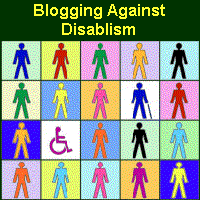I first read Our Bodies, Ourselves when visiting my brother and sister in law. My sister in law, who is pro choice, had it on her bookshelf. I found it to be a very comprehensive and informative resource on women’s health, despite not agreeing with its stance on abortion. I was thrilled, however, when I noticed discussion of the prenatal testing/disability rights issue, as well as disability and sexuality. Noticing my enjoyment of the book, my sister in law gave me the updated edition as a Christmas present.
Imagine my disappointment when I cracked the cover of the book and looked for those sections, only to find they had been removed. Issues related to race, religion, gender and sexual orientation remained, but discussions about disability had been relegated to a sidebar instructing anyone who wanted information on disability and prenatal testing to visit the OBO website. The section on disability and sexuality had been completely removed, without any mention of where that information could be found. As a woman with a disability, I felt ostracized. Here was a well-respected resource for women singling out disability as something so insignificant/controversial/whatever as to be segregated on the group’s website. The book, to put it candidly, was subtly telling women with disabilities that we had no role in the discourse surrounding reproductive rights. I did bring this up on an OBO blog post in 2010 and was answered by an administrator:
“I’ve been part of the editorial team for the past several editions of OBOS, including the one currently in production, due out in October 2011. We faced a lot of space constraints in 2005, as that edition was quite a bit smaller than the 1998 edition, and some of the content you mention was cut. But our recent single topic book, Our Bodies, Ourselves: Pregnancy and Birth (2008) has an entire chapter on prenatal testing that addresses the complicated issues raised by testing and underlying assumptions about disability.”
I appreciate that OBO legitimized my concern with a response, which shows that they took it at least somewhat seriously. I’m glad that their book on planned childbirth includes a section on prenatal testing and disability. However, I continue to feel frustrated. Facing “space constraints” is not an excuse for segregating disability to the group’s website. The omission of the previously cited material from the 2006 edition, and the explanation that this omission was due to space constraints, indicates that the editorial board considered disability to be of lesser importance than issues impacting other minority groups. The omission sends the message that prenatal testing and disability is only worth knowing about if one is a nondisabled woman planning a family. The implication is that women in general don’t need or want this information, let alone let alone that pertaining to disability and sexuality.
I don’t know what happened between 1998 (the first edition I read) and 2006 (the newer edition) to make the editors decide that disability issues no longer merited use of the space provided for their book. Was there someone on the 1998 committee with an interest in disability issues who was no longer on the committee when the 2006 version was compiled? Where people who experienced a termination for fetal disability offended that the book urged parents considering this decision to carefully consider their preconceptions regarding “quality of life,” and the editors felt their feelings trumped the concerns of disability advocates? The response I received indicates that the editorial board decided that something had to go and it might as well be disability issues. If so, did they appreciate how this decision contributed to the oppressive cultural zeitgeist that ignores the sexuality of people with disabilities, uses us as pawns in the abortion debate, and thrusts us outside the scope of human diversity? If not, why not? Why, in the very least, didn’t someone think that those with disabilities would complain about these changes? Did they just think we’re too powerless to say/do anything about them? Did the editors actually buy into the eugenic idea that people with disabilities shouldn’t/don’t have sex and hence didn’t deserve a place at the table when discussing issues related to sexuality and reproduction? I don’t know, but I feel these are all possibilities.
My next statement will be somewhat controversial: I think that whoever was in charge of the 2006 OBO book felt that the book was automatically disability friendly because it extols a politically liberal worldview. This is, of course, crap. While most disability advocates believe in things strongly supported by the Democratic party (social security, Medicaid/care, a full range of family planning choices, LGBT rights, healthcare reform) we do have positions that deviate from mainstream liberalism, including critiques of selective abortion, efforts to eliminate institutions in favor of small group housing, and strong opposition to assisted suicide/euthanasia. We also support the social model of disability, something that people on both sides of the political aisle have struggled to accept or have resisted completely. People on the right shouldn’t expect our automatic support because they oppose selective abortion, and people on the left shouldn’t expect our automatic support simply because they support Medicaid/care. This is the result of both sides seeing us as “the least of these” who they, of course, want to support. If there is no understanding of what that support entails, the so-called support becomes a very cynical form of tokenism. I hope that the 2011 edition reflects a reconsideration of whatever lead the editors to exclude disability issues in 2006.

